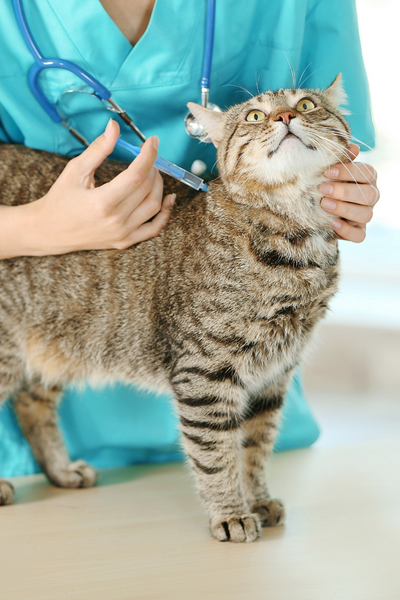
Why Are Pet Vaccinations Necessary? (Cat Edition)
(by Dr. Iuliana Mihai, DVM) Have you bought or adopted a kitten or an adult cat that did not come with health records, and you need to know what steps to follow to keep your cat healthy?
In any case, you should first visit your veterinarian for a general consultation and assess the health of your cat. A vaccine can only be administered if your pet is clinically healthy. We do not want to compromise the cat's immune system, especially if it suffers from a medical condition.
In order for your cat to be healthy and thriving for a long time, you should vaccinate it when able. This procedure is performed only by the veterinarian, who will also provide health documentation.
Vaccination of the cat is important for its health, particularly if it is an outdoor cat. Without vaccines, your pet may contract certain diseases, which can have permanent consequences or even be fatal.
Because vaccines help prevent diseases, they can also help you avoid extra expenses. Vaccines also prevent diseases that can be transmitted between animals (such as rabies) and also from animals to humans.
What Should Be Considered Before Vaccination?
If you want to vaccinate your cat, first make sure it is healthy, properly dewormed, and fed. The deworming of the pet is also important for humans because cats/dogs can be carriers of certain parasites that are transmitted to us, such as tapeworms.
Once those items are addressed, the vaccine can then be effective and will not weaken the cat's immune system. If your cat's body is sick or weak, vaccination will give your cat little to no immunity, depending on the severity of your pet's health.
At What Age Can a Cat Have its First Vaccine?
Kittens begin the vaccination scheme at the age of 6-8 weeks. A basic immunization with the most common vaccines against feline panleukopenia and cat flu is usually recommended. This way, your baby cat will be protected against some of the dangerous diseases.
In the first weeks of life, kittens are still protected by the antibodies they get from their mother, which are present in their blood; they receive these antibodies through milk, when they feed. During this period, they can strengthen their own immunity against pathogens only up to a certain point. Therefore, it is recommended to repeat the vaccine at the age of 12 weeks.
If the cat is already over 12 weeks old at the time of vaccination, a single vaccine is enough to give it a safe immunity. The cat shouldn't come in contact with other pets for at least three weeks after the last vaccination in the initial set of immunizations - during this period, the kitten's body creates antibodies to those diseases.
Adult cats must also be vaccinated. Although their immune system is more defined, they can contract the diseases in the vaccination scheme at any time, especially if their immune system has never come into contact with those diseases' antigens or vaccine antigens.
After the scheme is completed, according to the recommendations of the vaccine manufacturers, the vaccination should be repeated annually.
If you decide to buy a kitten, it is recommended not to take them from their mother before eight weeks (until this age, they take their antibodies from their mother's milk). Ideally, you should buy a kitten after the age of 12 weeks, when it has both vaccines done. This way, you will make sure that it has the necessary antibodies for dangerous viruses.
Vaccines Recommended for Cats (1):
| Cat Disease |
Kitten Vaccination (8-12/16 weeks) |
Adult Cat Vaccination (at 12-16 weeks+)/ Yearly booster |
| Rabies | Single dose at 8 weeks of age | Single dose Yearly booster |
| Feline Distemper (Panleukopenia) |
8 weeks, next dose at 3-4 weeks, until the age of 12 weeks | 2 doses, 3-4 weeks apart Yearly booster |
| Feline Herpesvirus (Rhinotracheitis) |
8 weeks, next dose at 3-4 weeks, until the age of 12 weeks | 2 doses, 3-4 weeks apart. Then, 1 dose the next year (after the completed scheme), then every 3 years *The cat should test FeLV negative first |
| Calicivirus | 8 weeks, next dose at 3-4 weeks, until the age of 12 weeks | 2 doses, 3-4 weeks apart After this, 1 dose the next year (after the completed scheme), then every 3 years |
| Feline Leukemia Virus (FeLV) | 8 weeks, then 3-4 weeks later | 2 doses, 3-4 weeks apart Outdoor cats – booster every year. Indoor cats – booster at one year. No further vaccination is needed unless they are at higher risk |
| Bordetella | As early as 4 weeks of age. *others recommend not less than 16 weeks old. (2) |
2 doses, 1 year apart. Yearly booster |
Although vaccination can be started at the age of 6 weeks, it is recommended to start the vaccination schedule at 8 weeks, if the kitten has been weaned.
Do Indoor Cats Need to be Vaccinated?
The administration of the vaccine to cats is essential even if most people who have a cat in their family do not consider that it is exposed to risks. An apartment or indoor cat will not be protected just because it does not venture on the streets or in nature - it can be affected by some of those serious diseases. Protecting and isolating your cat is not the best method of prevention, as vaccination is more effective.
Usually, cats that do not have access to outside and do not have any contact with unknown cats are less likely to contract diseases. But there are also typical feline diseases that can be transmitted even without contact with other cats. For example, feline panleukopenia and feline cold. Therefore, a vaccine against these diseases is as useful for indoor cats as it is for outdoor cats.
Diseases for Which Vaccination is Required in Cats
Rabies. Cats are considered a high-risk species for transmitting the rabies virus to humans in some European countries. The rabies virus is a single-stranded RNA virus of the genus Lyssavirus, in the family Rhabdoviridae. It is transmitted through the exchange of blood or saliva from an infected animal. The main way of transmitting the rabies virus is through a bite from wild animals that carry the disease. The virus is also transmitted through scratches. It is transferred through saliva and is very infectious.
In cats, the incubation period is 10-15 days. The cat is aggressive from the beginning, meowing incessantly, in a shrill, then hoarse voice, attacking animals and people, biting and scratching. It also has heavily dilated pupils. In the paralytic phase, paresis and paralysis of different muscle groups occur.
Animals suspected of rabies infection should be isolated and monitored very carefully. The confirmatory diagnosis comes after the pathological material (nerve substance from the brain, imprint from the salivary gland or cornea) is examined. Rabies is 100% deadly.
Feline Distemper (Panleukopenia). It is a very serious infectious disease that occurs in unvaccinated or improperly vaccinated kittens and is caused by a parvovirus. Feline distemper can be fatal.
It can be transmitted: - intrauterine (from mother to kitten and thus infection of the newborns), - directly, through contact with sick animals or their feces, - indirectly through contact with shoes, clothes, or other animals.
In cats, the incubation period is 3-5 days, but there are also cases in which the incubation period was between 7 and 21 days. During all this time, there is a severe decrease in white blood cells. This disease affects the digestive tract and causes lesions in the mucosa. The clinical signs include loss of appetite, vomiting, bloody diarrhea, fever, dehydration, severe lethargy, abdominal pain.
Without proper treatment, the chances of survival in this disease are less than 10%, but establishing a therapeutic protocol according to blood tests and further investigations increases the survival rate by more than 90%.
Feline Herpesvirus (Rhinotracheitis). Feline viral rhinotracheitis is an infection of the upper respiratory tract (URI) of cats (the nose and throat). This infection is caused by feline herpesvirus 1 (FHV-1) and can affect cats of all ages, the most sensitive being kittens, pregnant cats, or those with low immunity.
It takes between 2 and 5 days until the cat will show symptoms of the disease. The main symptoms of the disease are persistent sneezing, nasal and ocular secretions, loss of smell, conjunctivitis, loss of appetite, fever, sometimes cough, and apathy.
This disease is not transmitted to humans, but secondary bacterial infections can develop, which in some cases, can affect humans or other animals. If left untreated, it can be fatal.
Calicivirus. It is a serious infectious disease that can become fatal to your cat. Because the virus infects the cat's respiratory system, the main signs of infection are respiratory: nasal mucus, sneezing, respiratory failure, loss of appetite, lethargy. If treatment is started in this stage, the development of the disease can be stopped.
However, this disease is often mistaken with the common cold, in which cases time may be lost, and then the secondary symptoms appear, such as: nasal and ocular secretion becomes purulent and abundant; ulcers appear in the mouth and the area of the nose; saliva is abundant; foci of inflammation appear on the mouth; fever; muscle tone increases; the lymph nodes become inflamed.
Contact your local veterinarian to schedule your cat immunizations. Luckily, many veterinarians also provide annual reminders for recommended care including vaccinations and booster shots.
Spring Naturals is the Healthy Food Choice
Our team at Spring Naturals knows you care about the health of your beloved pet, so we’ve handcrafted our recipes to be the most nutritionally and functionally balanced dry dog and cat food on the market today.
We were the first to introduce whole pet food and the first to be certified low-glycemic. We were also the first to use human-grade meats and nutrient-dense superfoods like whole fresh fruits, berries, and vegetables. Browse our selection of cat foods in a variety of flavors at SpringNaturals.com/collections/cats-1.
References
1. https://pets.webmd.com/pet-vaccines-schedules-cats-dogs#2
2. https://pets.thenest.com/bordetella-vaccine-cats-8838.html
Dr. Iuliana Mihai, DVM, Masters In Small Animals And Equines Pathology
Iuliana graduated from the University of Agronomical Sciences and Veterinary Medicine in 2012, Romania. She has a Master’s degree in Small Animal and Equines Pathology and a strong affinity for Veterinary Parasitology and Laboratory. In 2013 she started her Ph.D. in epithelial cancer in dogs and cats. She volunteered at the faculty’s clinic at her 3rd year of study, and continued her career in small animal pathology and laboratory. She has one cat and eleven rats. Her interests outside of work include traveling, writing, and crafting.

Post a Comment!